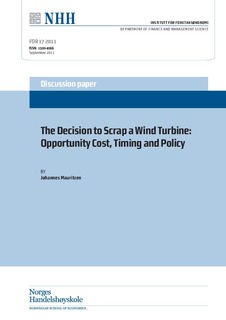| dc.contributor.author | Mauritzen, Johannes | |
| dc.date.accessioned | 2013-03-08T09:27:57Z | |
| dc.date.available | 2013-03-08T09:27:57Z | |
| dc.date.issued | 2011-09 | |
| dc.identifier.uri | http://hdl.handle.net/11250/164181 | |
| dc.description.abstract | This paper attempts to empirically identify the key factors involved in the decision to
scrap a wind turbine using data from Denmark. The importance of the opportunity cost
of operating an older wind turbine is shown to be a prominent factor in the decision to
scrap. I show the strong effect that renewable energy policy plays in the decision to scrap
a turbine. Through the use of both non-parametric and semi-parametric duration models
and an instrumental variables approach I identify a strong effect for scrapping schemes
put in place by the Danish government. I also obtain the, initially, counter-intuitive
result that more effective wind turbines have a higher hazard of being scrapped. | no_NO |
| dc.language.iso | eng | no_NO |
| dc.publisher | Norwegian School of Economics. Department of Finance and Management Science | no_NO |
| dc.relation.ispartofseries | Discussion paper;2011:17 | |
| dc.subject | wind power | no_NO |
| dc.subject | Denmark | no_NO |
| dc.subject | duration models | no_NO |
| dc.subject | scrapping | no_NO |
| dc.title | The decision to scrap a wind turbine : opportunity cost, timing and policy | no_NO |
| dc.type | Working paper | no_NO |
| dc.subject.nsi | VDP::Social science: 200::Economics: 210::Business: 213 | no_NO |
